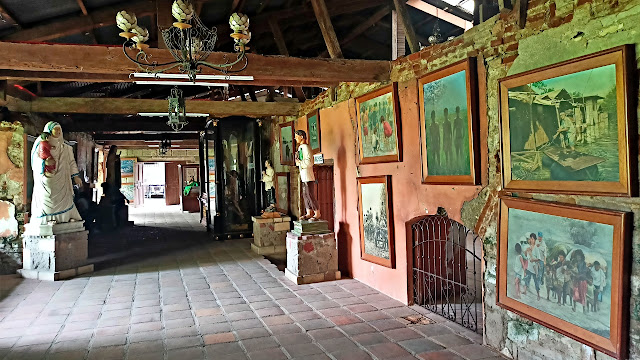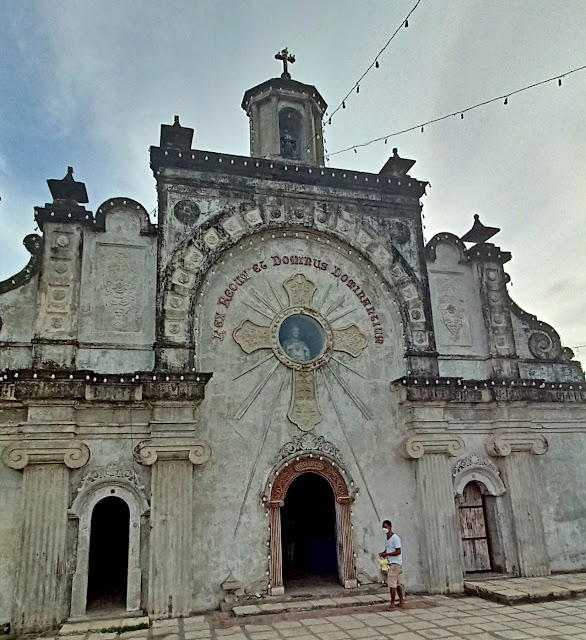Years after its 1991 eruption, the wrath of Mount Pinatubo continued to be felt. Case in point is the San Guillermo Parish Church in Bacolor, Pampanga. On September 3, 1995, after days of torrential rains, a raging lahar flow from the slopes of the previously thought dormant volcano buried the town about half a dozen meters deep.
 |
| Only half of the church remains unburied by the lahar flow |
After the lahar flow solidified it raised the ground 20 feet up, nearly swallowing the parish church in half as more than 50,000 people from surrounding communities fled to safer ground.
 |
| Only a peek remains from the church's pre Pinatubo explosion windows |
Despite occasional lahar flows occurring following severe rains, the town folks of Bacolor banded together to salvage what remained of their parish church.
 |
| The central Retablo of San Guillermo Parish Church |
Residents took turns excavating the original retablo and other century-old statues of saints from the solidified muck, and soon after, they poured new concrete on the church's elevated floor, thus constructing a new church out of the buried one.
A formidable foe of nature
A bastion of the faithful’s spirituality, San Guillermo Parish Church also served as an emblem of resiliency as evidenced by the many forces of nature it has faced since it was originally built by the Augustinians in 1576.
 |
| The façade of Bacolor Church in present day's half-buried state |
After countless pounding from typhoons and tremors, the church finally bowed down to a strong earthquake in 1897. It was soon quickly rebuilt complete with a central nave and well-illuminated cruciform with windows. Inside, churchgoers would be seen kneeling in front of the central retablo when attending mass and reciting their prayers. On given occasions, they listen to special announcements from the priest who stands on the pulpit, which is highly adorned with gold leaves.
 |
| The hallway leading to the small museum |
Designed in Baroque-style of architecture and in honor of the town's patron saint, San Guillermo Ermitaño, the church also came with its own monastery, that was momentarily transformed into a headquarters by Simón de Anda, the Spanish Basque Governor of the Philippines, when the British attempted an invasion of Manila in 1762.
Bury me not
In what could have been a bane that spelled the end of the church's existence, has instead given San Guillermo Parish Church a deeper meaning for its parishioners by embodying the inseparability of faith and perseverance.
 |
| Paintings and photographs depicting the aftermath of Mount Pinatubo's eruption |
As I enter the church through its arched doorway now only half as high as it once was, I immediately sensed an aura of mystery and solemnity. The ceiling of the church, which in most old churches towers greatly, appears nearly reachable here, as if the church itself were squeezing the visitors' preexisting spirituality closer and making the whispers of prayers less muffled.
 |
| The door looks so tiny |
On the right wing of the church where the old convent was located is now transformed into a museum displaying recuerdos from the church's history, religious icons as well as images of the town of Bacolor and the church taken after Mount Pinatubo erupted.
 |
| San Guillermo Church |
Outside, I saw a couple of ladies throwing coins on a well. Despite my skepticism on such things, I plucked a 5-peso coin from my pocket, made a wish, and flipped it up backward unto the well.
 |
| Wishing for tomorrow's peace of mind |
I walked towards the outer walls of the church at the back where the extent of the lahar flow appear more obvious. The sight took my emotions all over the place as I think about the town residents' determination to restore the church from its ruinous state.
Considering everything that Bacolor Church has been through, it probably wasn't a coincidence that it was used as a setting for the 2010 ABS-CBN primetime series "May Bukas Pa." Because, as the title suggests, there will always be another day to soldier on, just what the people of Bacolor and San Guillermo Parish Church have shown.






















